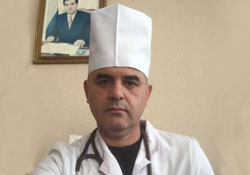Experiences with antibiotic resistance: the perspective of a doctor from Tajikistan

WHO
Dr Turakhon Sharipov is the Deputy Head Physician at the Municipal Infectious Diseases Hospital in Dushanbe, Tajikistan. He routinely deals with cases of antibiotic resistance, most frequently related to pulmonary, intestinal and skin infections. Here, he discusses his experiences and offers advice to other health workers.
How do you encourage your patients to use antibiotics responsibly and properly?
We educate our patients about matters of personal hygiene and treatment compliance, including the duration of medication. Errors in prescription and dosage of antibiotics, as well in the duration of therapy, are the principal causes of failures in antimicrobial therapy. So, for education purposes, we use the best examples of patients fully complying with the treatment regimen and dosage. This is key to effective treatment.
What advice would you give to your fellow health workers when it comes to preventing the spread of antibiotic resistance?
We must prescribe antibiotics with utmost care and always try to find the most suitable drug, dosage and duration of therapy. We should not change drugs too often, and we must always consider the issue of reserve antibiotics. Consider making a list or a register of antibiotics that are effective against certain infections, and follow the treatment guidelines applicable for your region.



